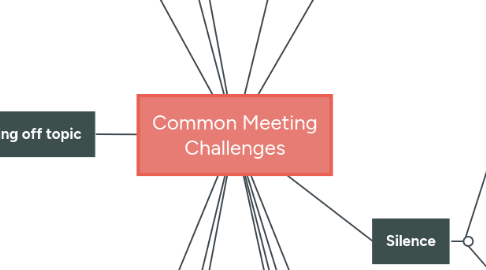
1. Multitaskers
1.1. Participants continue to work on their laptops or check their phones etc. during the mtg.
1.2. Suggestions
1.2.1. Lay out ground rules at the beginning of the meeting
1.2.1.1. " To ensure we all respect each other's time, let's make an agreement to one another that we won't do other work or check email during this meeting."
1.2.2. Actively engage participants by asking individuals to share their thoughts
2. Conflict
2.1. Participants have differing opinions and discussions get heated.
2.2. Suggestions
2.2.1. Watch for cues that you should redirect the conversation
2.2.2. Don't stifle conflict at first indication, but tune in to the group to see if the group is stressed or worried
2.2.3. If there is unhelpful conflict that is veering off-topic, bring the group back to the agenda
2.2.4. Bridge the difference of opinion
2.2.5. Suggest the group moves forward if you cannot bridge the difference of opinion
3. Circular or Repetitive Discussion
3.1. The discussion is not moving forward
3.2. Suggestions
3.2.1. "It seems we're not making progress on this topic"
3.2.2. Identify reasons you can't move forward
3.2.3. If input or additional info. is needed, acknowledge that you won't be able to make a decision on that point during the meeting. Identify next steps then move on to the next topic
3.2.4. Bring the group back to the agenda
4. Going off topic
4.1. Suggestions
4.1.1. Use the "Parking Lot" technique to "park" topics brought up that are not in line with the agenda
4.1.2. Keep the agenda visible and reference to focus of the discussion
4.1.3. Robert's Rules of Order Newly Revised:
4.1.3.1. Interrupt the person speaking
4.1.3.2. Thank them for their input
4.1.3.3. Remind everyone of the time limit on the topic
4.1.3.4. Move on to the next agenda item
5. Negativity
5.1. A participant who repeatedly says the idea will never work or disagrees with everything
5.2. Suggestions
5.2.1. Ask that person what they think might work instead
5.2.2. Acknowledge the roadblocks they've pointed out & ask how the group can get around those roadblocks
5.2.3. Challenge and ask if they have experience that concretely tells them that ti won't work
5.2.4. Ask for feedback or new ideas based on the experience
5.2.5. "You say that these ideas won't work based on your previous experience with that team. Can you suggest an approach that might be more successful?"
5.2.6. "I hear your concern re: these ideas. Let's give the group a chance to brainstorm and come up with various ideas. Maybe we'll find some that are good options."
6. Passive Aggressive Behavior
7. Last Minute Declines or No Response
7.1. Key participants decline the invite last minute or do not show.
7.2. Suggestions
7.2.1. Reach out to attendees prior to the meeting
7.2.2. Reschedule the meeting
7.2.3. Meet 1:1 with the person who declines, share the importance of their participation and see what can be done to make the time work
7.2.4. Record meetings for those who cannot attend
8. Late Arrivals
8.1. One or more participants arrive late and thus the meeting doesn't start on time
8.2. Suggestions
8.2.1. Add a message to the invite
8.2.1.1. "In order to cover all items and respect everyone's time, please arrive on time. The meeting start promptly at _______"
8.2.2. Address the group
8.2.2.1. Best used for recurring mtgs where tardiness is chronic
8.2.2.1.1. Recognize that everyone's time is important
8.2.2.1.2. Ask for everyone to help with this by arriving on time moving forward
9. Hijackers
9.1. One or more participants dominate or "hijack" the discussion and don't allow others to speak.
9.2. Helpful Phrases
9.2.1. "Does anyone else have input?"
9.2.2. "That's a valid point. It would be great to get input from others as well. Can anyone else share your thoughts"
9.2.3. "I want to make sure we hear from others on this point"
9.2.4. "What does everyone else think about that idea?"
9.2.5. "Because of time constraints, we should move forward with the agenda. Let's put that in the 'parking lot' and come back to it at a later time."
9.2.6. "You've presented an interesting point. What do others have to offer on this?"
9.2.7. "We need to keep moving forward."
9.2.8. "I've captured that point. Let's move forward and hear from others
10. Silence
10.1. You fail to get input at all from particpants
10.2. Suggestions
10.2.1. Wait silently for about a minute (give people time to think)
10.2.2. Try prompting with different questions to get the discussion moving
10.2.3. Call someone by name and rephrase the question in a way that'll be easy for them to answer
10.2.4. Ask a specific person for his or her opinion, then others will put up their hands
11. Side Conversations
11.1. Having more than one debate simultaneously can be distracting and disruptive
11.2. Suggestions
11.2.1. Ask for only one convo at a time
11.2.2. (if asking doesn't work) stop the main conversation you're leading and look patiently at the group carrying on the side convo or interrupt their discussion. Ask them to join the main conversation
12. Inability to make a decision
13. Background Noises (Remove Attendees)
13.1. Distracting noises on a call
13.2. Suggestions
13.2.1. Ask participants to mute their phones
13.2.2. "We're hearing background noises. Please mute your phones"
